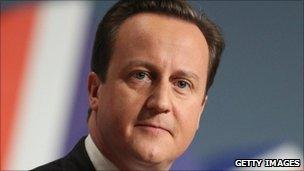Cameron says welfare reforms can 'solve poverty trap'
- Published

Mr Cameron insisted the welfare reforms were not all about saving money
David Cameron has defended the government's welfare reforms, saying they could help individuals and families get out of "the poverty trap".
At a No 10 news conference, the prime minister said its plans were "bold and radical" but the gains could be huge.
Simplifying benefits and ensuring people were better off in work than on welfare could transform lives, he said.
All welfare changes, including child benefit cuts, had been fully discussed with Lib Dem ministers, he insisted.
But Labour has said ministers are desperately hunting around for savings without enough thought given to their impact.
In his first meeting with the party's MPs and peers since becoming leader, Ed Miliband promised to stand up for the "squeezed middle" - the people who, he said, worked hard to pay their way to get by.
'Enormous prize'
A new method of assessing whether people are entitled to incapacity benefit is being launched in a handful of areas as the coalition's welfare reform programme gathers pace.
Ministers want anyone among the 2.5 million current claimants who are deemed fit enough to start work to do so.
At his first Downing Street news conference of the autumn, the prime minister said reducing the welfare bill was one of the many "very difficult" decisions that ministers were currently grappling with in the run-up to next week's comprehensive spending review.
Welfare could not be immune from attention, he said, as the government sought to substantially cut government borrowing over the next five years - with individual departments facing cuts of at least 25%.
"If you want to deal with the deficit, you have to deal with welfare," he told reporters.
But he said the reforms were not all about saving money, as simplifying welfare by consolidating all out-of-work and in-work benefits into a single payment could transform the lives of individuals and families which had not worked for generations.
The new proposed universal credit, ministers say will be designed to enable those moving from welfare to work to keep more of their income for longer and ensure they were better rewarded in work, would help tackle the underlying causes of poverty.
"I think that will, over time, solve the whole poverty trap issue that has bedevilled governments of all colours," he said.
"It used to be a poverty trap that mostly affected people out of work. Then it became more of a poverty trap that affected people on low paid work. Now it is a poverty trap that can affect both."
"The universal credit system can solve that problem. That is an enormous prize that has eluded governments for years."
'Seen to be fair'
He also defended proposed cuts to child benefits for higher-rate taxpayers, which have prompted a backlash among some Conservative supporters, saying it was right that those further up the income scale had to make sacrifices.
Money-saving measures "have got to be fair and seen to be fair", he insisted.
All benefit decisions were reached collectively "round a table", he said, with Chancellor George Osborne, Work and Pensions Secretary Iain Duncan Smith, Deputy Prime Minister Nick Clegg and Chief Secretary to the Treasury Danny Alexander all involved.
Labour has said it will consider the government's welfare plans on their merits but warned that cuts would inevitably hit the most vulnerable. It said a proposed £26,000 cap on the amount of benefits a single family could get was counter-productive.
- Published11 October 2010
- Published5 October 2010
- Published2 October 2010